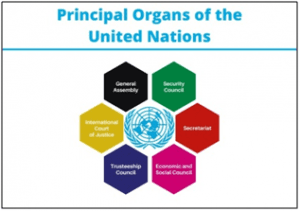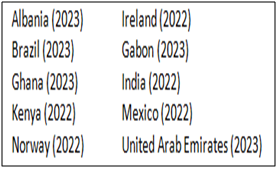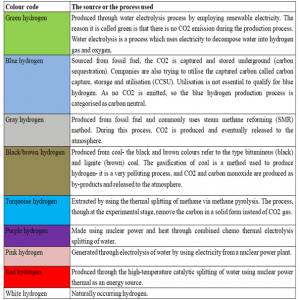THE CONTEXT: The Ukraine crisis has crossed a critical point, with Russia following up its recognition of rebel regions in eastern Ukraine (Donbas region)- Donetsk and Luhansk with a full-fledged invasion to “demilitarise” and “denazify” Ukraine.The United Nations Security Council (UNSC), on 27 February 2022, voted to convene an emergency special session of the General Assembly to consider a resolution on the situation in Ukraine, vetoed by Russia.
ABOUT UNITED NATIONS SECURITY COUNCIL (UNSC)
United Nations Security Council was established by 51 UN founding countries in 1945.
- It has primary responsibility, under the UN Charter, for the maintenance of international peace and security.
- The Security Council is made up of fifteen member states, consisting of five permanent members (P5)—China, France, Russia, UK, and the USA—and ten non-permanent members elected for two-year terms by the General Assembly on a regional basis.

- Election of non-permanent members: non-permanent members are elected by a two-thirds vote of the UN General Assembly. The main criterion for eligibility is contribution “to the maintenance of international peace and security,” often defined by financial or troop contributions to peacekeeping operations. Present non-permanent members are mentioned in the table.
- Subsidiary organs that support the Council’s mission include:
Counter-Terrorism Committee, Sanctions Committee, Peace Keeping Operations, International Courts, and Tribunals.
- UNSC and UNGA:

The Council also makes recommendations to the General Assembly to appoint a new Secretary-General and to admit new members to the UN. Security Council decisions are formal expressions of the will of the Council.
The Security Council, the United Nations’ principal crisis-management body, is empowered to impose binding obligations on the 193 UN member states to maintain peace.
The Council’s presidency rotates on a monthly basis, ensuring some agenda-setting influence for its ten non-permanent members, which are elected by a two-thirds vote of the UN General Assembly.
The unconditional veto possessed by the five permanent members has been seen as the most undemocratic character of the UN.
“Veto power” refers to the power of the permanent member to veto (Reject) any resolution of the Security Council.
Critics claim that veto power is the main cause for international inaction on war crimes and crimes against humanity.
Supporters of the veto power regard it as a promoter of international stability, a check against military interventions, and a critical safeguard against U.S. domination.
SUCCESSES OF UNSC
- Since 1948, the UN has helped end conflicts and foster reconciliation by conducting successful peacekeeping operations in dozens of countries, including Cambodia, El Salvador, Guatemala, Mozambique, Namibia and Tajikistan.
- UN peacekeeping has also made a real difference in other places with recently completed or on-going operations such as Sierra Leone, Burundi, Côte d’Ivoire, Timor-Leste, Liberia, Haiti and Kosovo. By providing basic security guarantees and responding to crises, these UN operations have supported political transitions and helped buttress fragile new state institutions. They have helped countries to close the chapter of conflict and open a path to normal development, even if major peacebuilding challenges remain.
CASES IN THE RECENT PAST WHERE THE UN SYSTEM APPEARS TO HAVE FAILED QUITE VISIBLY.
COUP IN MYANMAR
- Myanmar Military (Junta) last year in February took over the democratically elected government, putting the elected leaders in prison, slapping them with national security cases and even declaring full emergency.
- UNSC has held at least 3 rounds of discussions on the issue but has taken no action yet against the Junta for the coup.
- All this comes against the already persisting and unresolved situation of the Rohingya Refugees and humanitarian crises.
TALIBAN TAKEOVER OF AFGHANISTAN
- So far there have been three discussions in UNSC over the issue and one resolution but have not been able to deliver any binding or punitive statement rather at present the resolution shows the Taliban as the default force ruling the country.
- The UN has also failed to instil the idea of UN-led Transitional Council unlike in the case of East Timor where it ran the transitional Council until it handed over after the independence of the country.
RUSSIA’S MILITARY ACTION ON UKRAINE
- Russia vetoed a UN Security Council resolution, that would have demanded that Moscow immediately stop its attack on Ukraine and withdraw all troops.
- This significantly clears the doubt surrounding the abuse of veto powers being used by P5 countries.
ISSUES AND PROBLEMS WITH UNSC
GROUP OF ELITES
- The winners of WW2, P5 members (France, Russia, United Kingdom, China and the United States) hold the veto powers and all the members are nuclear powers, only addressing the strategic interests and political motives of the permanent members.
ANACHRONISM OF PRESENT TIMES
- The veto powers that the UNSC’s five permanent members enjoy are an anachronism in this age. The UNSC in its current form has become a constraint in understanding the international changes and dynamics in the area of human security and peace
POWER PLAY IN UNSC
- Divisions among the P5 i.e. there is a deep polarization within the UN’s membership, so decisions are either not taken, or vetoed.
- Frequent divisions within the UNSC P5 end up blocking key decisions.
- Example: With the coronavirus pandemic emergence, the UN, the UNSC, and WHO failed to play an effective role in helping nations deal with the spread.
ABSENCE OF RECORDS AND TEXTS OF MEETINGS
- The usual UN rules don’t apply to the UNSC deliberations, and no records are kept of its meetings.
- Additionally, there is no “text” of the meeting to discuss, amend or object.
IRONIC CONDITION
- The main purpose of the UN is to maintain peace and stability in the world. Five permanent members of the UN Security Council are the top five largest arms dealing countries in the world.
EFFECTIVENESS AND RELEVANCE
- Unable to respond effectively to the emerging international conflicts and other humanitarian crises.
AN UNDER-REPRESENTED ORGANISATION
- The existing gaps in terms of the under-representation of regions especially from Africa, Asia and Latin America are crippling the UNSC as a global institution governing international peace and security.
- The absence in the UNSC of the globally important countries – India, Germany, Brazil and South Africa – is a matter of concern.
REFORMS IN UNSC
WHAT SHOULD BE THE APPROACH
• Reforms must reflect contemporary global realities and for this purpose, the reform of the UN including the expansion of the UNSC in both permanent and non-permanent categories is essential
REGIONAL REPRESENTATION
- European bias in P-5 is due to the presence of the UK, France and Russia while regions like Latin America, Caribbean group, Arabs and Africa do not have a single permanent member.
- There is a need to overcome the European and Western hegemony and have equitable geographical representation.
CHANGING GEOPOLITICS
- The victors of World War II shaped the United Nations Charter in their national interests, dividing the permanent seats, and associated veto power, among themselves.
- It has been 76 years since the foundation of UNSC and the geopolitical realities have changed drastically and the structure of UNSC should also reflect the same.
QUESTION OF VETO
- Veto power is grossly misused by the permanent members in their own interests. This also badly affects the conduct of the business of UNSC as many important proposals involving substantive issues get blocked. The Veto shall be rarely and cautiously used by world leaders.
TRANSPARENCY AND WORKING METHODS
- While the expansion of the Security Council has been hotly debated across the world, debate on the working methods of the Council is an equally important aspect of reform to many member states.
- The participative, consultative and democratic approach of the functioning of the UN in general and UNSC, in particular, should be adhered to.
KOFI ANNAN MODEL FOR REFORMS – 2005
In 2005, the Former UN secretary-general presented two models for a total of 24 seats in the Council.
Model A: Six new permanent seats, with no veto being created, and three new two-year term non-permanent seats, to have representation from all regions.
Model B: No new permanent seats but create a new category of eight 4-year renewable-term seats and one 2-year non-permanent and non-renewable seat.
CHALLENGES FOR REFORMS
AMENDMENT TO UN CHARTER
This amendment involves a two-stage process:
- Stage I: General Assembly must approve the reform by a two‑thirds majority (i.e. at least 128 states).
- Stage II: amended Charter must then be ratified by at least two‑thirds of the member states, including the five permanent Council members.
- This process includes all Security Council’s permanent members, and they may not take a step to curb their own powers.
POLITICAL WILL AND INTEREST OF P5
- Every country’s actions are based on its national interests and no one likes to get its power diluted.
- There has been no consensus reached among the UN members including the P5, on how to adjust the Security Council’s structure and in particular how to increase the number of new permanent members.
INTERGOVERNMENTAL NEGOTIATIONS
- There is no coherence in the approach of supporters of UN reforms, The G4 bid has been opposed by a few countries, whereas other groups like Coffee Club opposed adding countries as permanent members.
- The 13-member group that includes Pakistan and is known as United for Consensus (UfC) has been in opposition to adding more permanent members to the Council.
INDIA AND UNSC
Why India should be admitted as a permanent member?
- The expansion of the Security Council, in the category of both permanent and non-permanent members, and the inclusion of countries like India as permanent members, would be a first step in the process of making the United Nations a truly representative body.
- At the core of India’s call for reformed multilateralism, lies the reform of the UN Security Council, reflective of the contemporary realities of today. When power structures continue to reflect the status quo of a bygone era, they also start reflecting a lack of appreciation of contemporary geopolitical realities.
- The Charter of the United Nations, alongside the call for a geographically balanced distribution of seats, also expressly states that countries that make considerable contributions to the UN should be members of the Security Council.
- India’s performance as a non-permanent member of the Security Council during 2011- 2012 has also significantly strengthened India’s claim to permanent membership
- By any objective criteria such as population, territorial size, GDP, economic potential, civilizational legacy, cultural diversity, political system, India is eminently suited for permanent membership of an expanded UNSC.
Why should India bid for a permanent seat in UNSC?
- The largest democracy in the world.
- 3rd largest economy.
- Home to 1/6th of the total world population.
- One of the largest peacekeeping contributors to the UN.
INDIA IN UNSC AS A NON-PERMANENT MEMBER FOR THE EIGHTH TERM (2021-2022)
INDIA’S 5-S APPROACH • SAMMAN – Respect
- SAMVAD – Dialogue
- SAHYOG – Cooperation
- SHANTI – Peace
- SAMRIDDHI – Prosperity
NEW OPPORTUNITIES FOR PROGRESS
- As a rule-abiding democracy and a positive contributor to the security of the global commons, India should work constructively with partners to bring innovative and inclusive solutions to foster development.
- India calls for greater involvement of women and youth to shape the new paradigm.
EFFECTIVE RESPONSE TO INTERNATIONAL TERRORISM
- Addressing the abuse of ICT by terrorists.
- Disrupting their nexus with sponsors and transnational organised criminal entities.
- Stemming the flow of terror finance.
- Strengthening normative and operative frameworks for greater coordination with other multilateral forums
COMPREHENSIVE APPROACH TO PEACE AND SECURITY
India’s vision for international peace and security is guided by:
- Dialogue and cooperation.
- Mutual respect.
- Commitment to international law.
INDIA ON RUSSIA-UKRAINE ISSUE
- India strongly emphasized the need for all sides to exercise the utmost restraint and intensify diplomatic efforts to ensure a mutually amicable solution.
- India abstained from voting on the UNSC resolution condemning Russia’s aggression on Ukraine.
OUTCOMES OF INDIA’S PRESIDENCY
- The event was the first time when there was a comprehensive debate on the holistic concept of maritime security.
- Two other signature events – on Peacekeeping and Technology on August 18 and the briefing on Islamic State on August 19.
- India exchanged a Memorandum of Understanding (MoU) with the UN in support of the ‘Partnership for Technology in Peacekeeping’ initiative and to UN C4ISR Academy.
- For the first time, the Security Council held an open debate focused exclusively on how technology can aid in peacekeeping and for the first time, it adopted a presidential statement on the topic of technology and peacekeeping.
- India drafted a resolution on peacekeeping focused on ensuring accountability for crimes against peacekeepers. The resolution was sponsored by 80 member states, including all 15 members of the UNSC.
- First resolution being adopted by the Council on the situation in Afghanistan following the takeover of Kabul by the Taliban.
- The UNSC successfully steered the discussions on various peace and security issues that are on its agenda, including Myanmar, Syria, Yemen, and the Middle East Peace Process.
WHAT SHOULD INDIA DO?
- India should leverage its past experiences as a non-permanent member.
- India also needs to revitalise its engagement with its traditional partners in the “global south” by voicing its peace and security concerns in the UNSC. In this context, two sub-groups of the global south should be of particular interest: the Small Island States and Africa.
- The G4 nations of India, Brazil, Germany and Japan have reaffirmed that it is “indispensable” to reform the Security Council through an expansion in permanent and non-permanent seats to enable the UN organ to better deal with the “ever-complex and evolving challenges” to the maintenance of international peace and security.
- It’s been clear for some time now that the global multilateral order is not fit for its purpose. The Covid pandemic, Afghan issue, Nagorno-Karabakh issue and now Russia’s military action on Ukraine have only made the world more aware of the real-time consequences of this gradual decay. The United Nations Security Council has faced a lot of flak for not representing today’s international power realities and for not being able to shape the global discourse on the changing nature of security. Reforms in the UNSC and other multilateral institutions are the need of the hour.
THE WAY FORWARD FOR UNSC
- UNSC should be reformed to incorporate the adequate representation of every region of the world.
- Permanent seats in council should be increased.
- Council is acting like it’s 1945, this approach should be changed.
- Countries like India (Largest democracy in the world), Germany (Largest Economy of Europe), Brazil (Largest of Latin America) and one member from Africa continent should be the part of council with veto power.
- In order to enhance regional representation, there is consensus that the council must be enlarged to improve the current makeup, giving more weight to regions such as Africa, the Asia-Pacific and Latin America/Caribbean states, especially when most agenda issues centre on these regions.
- While an enlarged Council should address any democratic deficit and improve multilateralism, a modest increase has been preferred by P5 members to ensure it remains effective and does not descend into a talk shop unable to act quickly.
- Council should take lesson from the recent Russian attack and for future, it should be ready to stop such invasions.
- Permanent members of council should think beyond their interest to peacemaking.
THE CONCLUSION: The reform of the UNSC is a crucial issue on the current international agenda. Its progress will determine the effectiveness of the work of the whole UN system for the foreseeable future. The efforts in this area should be aimed, first of all, at enhancing the Council’s ability to promptly and effectively react to emerging challenges. This becomes even more relevant today as we witness multiple crises and conflicting situations.


